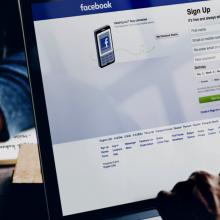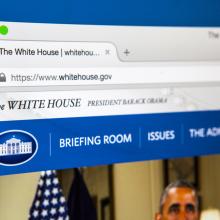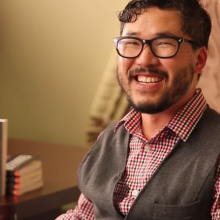social media
@JesusofNaz316 has a funny-sad-outraged quality. He sometimes uses the platform for irony or jokes, but more frequently for protest — sometimes against general injustice, but more often against the hypocrisy of Christians. His account, which has more than 16,000 followers, has been active since 2010. He is followed by progressive clergy like Diana Butler Bass and Rachel Held Evens and rabbis Danya Ruttenberg and Jonah Geffen, along with theologians and pastors from across denominations.
Amid revelations that extremist groups have exploited social media platforms like Facebook and Twitter to influence voters and steer readers toward fake-news, the nation’s premier anti-Semitism watchdog is training its eye on the tech world to combat hate speech online.
The Anti-Defamation League will hold a summit in San Francisco on Nov. 13 featuring Reid Hoffman, the co-founder of LinkedIn, along with executives from Facebook, Twitter, and Reddit to discuss ways of fighting the growing menace of cyber hate.
Women are showing that, despite being subject to the most violent and forceful manifestations of our patriarchal society and culture, they are willing to stand up in defiance and in solidarity to ensure that we as a society no longer allow incidents of sexual harassment and violence to go unchallenged, unnoticed, and unbelieved. And almost certainly, many other women who have experienced harassment or assault have decided understandably not to speak out. “Survivors don’t owe us their stories” explained Alexis Benveniste on twitter.

Rawpixel.com / Shutterstock.com
YOU COULD SAY it’s been the best of times and the worst of times for Facebook Inc. This summer the social media platform’s number of monthly users reached 2 billion. That’s more than one-fourth of the world population, and Facebook has achieved that global reach while still off limits for more than a billion Chinese. More than half of Facebook users log in every day; in the U.S., one out of every five internet page views takes place on Facebook. The company is currently valued at $435 billion.
This success has come despite what should have been a truly dreadful year for the company’s image. Rapes, murders, and suicides have been live-streamed on Facebook. And at least some of those atrocities may have been provoked by the unparalleled opportunity Facebook offers to sociopaths and exhibitionists. In addition, in the past year Facebook was guilty of helping disseminate false information that helped elect Donald Trump. The social network has also been widely named as a major contributor to our increasingly toxic political culture, in which citizens never have to face facts that might contradict their prejudices. A 2016 study from the University of Pittsburgh even found an association between social media use, including Facebook, and depression among young adults.
Social media, and Twitter especially, has become a place where people of all beliefs can come together for conversations about all manner of things, from men’s rompers to views on abortion. And from our worship leaders and in our pulpits, we hear the word of God for the people of God again, this time in person. So we’re constantly processing, constantly asking what God is saying to us, constantly asking who we should be as an institution, as the body of Christ.
Unplugging from social media or limiting one’s internet use for a set period such as during Lent can be helpful for some individuals. My research, conducted over two decades, however, shows that some core assumptions on which digital fasting is based can be problematic or misguided.
As a teacher of environmental education, I need to stay informed. But as a mother and writer, I need to stay grounded so I can advocate for justice for my children over the long haul. If my father could give up talking about George W. Bush for 40 days, could I take a Trump Sabbath and fast from the headlines for 24 hours?

Image via chrisdorney/Shutterstock.com
The meeting comes as nations around the world fight a sometimes losing battle against the highly-skilled online outreach of the Islamic State, which has done a remarkable job of using social media to create recruitment and public relations materials to promote its efforts. Apple, Facebook, and Twitter said Thursday they will have representatives at the meeting.

Image via WFAA-TV/RNS
Fort Worth, Texas, native Amneh Jafari never expected to help spark an international movement.
But when the senior University of Texas Arlington psychology major saw a picture on the news showing Irving teen Ahmed Mohamed in handcuffs for bringing a homemade clock to MacArthur High School, it felt personal.
“It really saddened me,” Jafari said.
“I have younger siblings, and I felt like I was looking at them.”

Image via @Kate_Kelly_Esq / Twitter / RNS
Mormons teach, preach, and sing about families being together forever in heaven, but some members of the Utah-based faith want to exclude one group from that promise, at least on Earth.
Undocumented immigrants.
And, while the LDS Church supports immigration reform that keeps families together, its leaders have not pushed that idea in worship settings where Mormons are gathered. Nor has it called out those who disagree. In other words, The Church of Jesus Christ of Latter-day Saints has gone largely silent on the issue.

Activists march in New York City on October 11, 2014 in solidarity with renewed protests in Ferguson, Mo. Photo via a katz / Shutterstock.com
One year after the shooting and killing of Michael Brown, #FergusonTaughtMe is trending on Twitter. Activists, faith leaders, intellectuals, and everyday members of the movement have used the hashtag to explain how Ferguson fundamentally altered their racial consciousness. Embedded are a few tweets from Christian leaders who shared how Ferguson changed the way they do faith.
1. Read the First Chapter of Harper Lee’s ‘To Kill a Mockingbird’ Sequel
Happy Christmas in July! Read this excerpt of the much-anticipated Go Set a Watchman — due to be released on Tuesday. Or listen to the chapter, featuring narration by Reese Witherspoon, over at The Guardian.
2. Pope Apologizes for Catholic Church’s ‘Offenses’ Against Indigenous People
"I humbly ask forgiveness, not only for the offenses of the church herself, but also for crimes committed against the native peoples during the so-called conquest of America."
3. When Algorithms Discriminate
So there’s this, from the Upshot: "Research from the University of Washington found that a Google Images search for ‘C.E.O.’ produced 11 percent women, even though 27 percent of United States chief executives are women. (On a recent search, the first picture of a woman to appear, on the second page, was the C.E.O. Barbie doll.)"
A friend recently found out that his girlfriend had been cheating on him. They broke up, she pleaded with him to take her back, they picked up where they left off, the trust issues proved too much to bear, and just a few days later he started dating another woman.
Interestingly, all of this information was divulged via social media. I, along with everyone else who knew the couple, was given front row seats to this Jerry Springer-ish episode that terminated their relationship.
As a society, we have definitely blurred some lines between what becomes public and what remains private.
Thanks to the abundance of information at our fingertips, we need only turn on the television or stand in the checkout lane or search Google to uncover the most up-to-date gossip on any public figure. And thanks to social media, we now get to know far more about our friends and acquaintances than we probably care to.
It seems that nothing is private anymore. But in what some may see as a terrible downturn in society, I find a glimmer of hope — this is, in part, paving the way for deep and relevant discussions on faith to take place in the public forum.
Yet when it comes to matters of faith, it seems a majority of us remain silent. Why is it that we will readily invite the entire world on our date via instagram, yet we are so hesitant to open up about our beliefs?
Eugene Cho is overrated.
At least that’s what he’ll tell you in his new book, Overrated: Are We More in Love with the Idea of Changing the World Than Actually Changing the World?
Cho, pastor at Quest Church in Seattleand founder of One Day’s Wages and Q Café, is an outspoken Christian voice for social justice. His first book is a self-professed confession of the risks of personal platform in the work of justice — and a call to humble self-awareness for Christians in an age of social change-idealism. When justice and changemaking are buzzwords, how do we embrace the long challenge of bettering the world while remaining humble about our place in it?
Watch the interview below.
ISIS terrorist rampages, waves of anti-Muslim hate speech and fear-mongering Islamophobia are inspiring an outburst of online activism in the form of Twitter hashtags.
The question is: Does it work, especially over the long term?
An army of “clicktivists” — a mix of earnest advocates and pointed satirists — has entered the fray armed with 140-character positive, peaceful or humorous counter-messages.
Using names such as #TakeOnHate, #IStandUpBecause, and #NotInMyName, the pushback approach promotes the complexity, diversity and positive contributions of Islam and Muslims. Others, such as #MuslimApologies, offer sarcasm in service of the same message.
Yet the hashtags are often immediately co-opted by trolls spewing an opposite message. And some experts question whether clicktivist campaigns have lasting worth.
Linda Sarsour has no doubt they do. She’s a Brooklyn-based Palestinian activist in the streets and on social media and a co-creator of #TakeOnHate. The hashtag is accompanied by a resource website, launched in March by the National Network for Arab American Communities.
“The insidious thing about anti-Arab hate speech is that it seems to be acceptable, where the ‘N-word’ or anti-Semitic remarks are not taken with the same degree of outrage,” said Sarsour, who was chased down the street in September by a man who was later arrested for threatening to behead her.
What does a map of the U.S. religious landscape look like in 140 characters?
A new study of Twitter finds that self-identified religious users are more likely to tweet to members of their own faith than to members of a different one. The study examined people whose Twitter profiles identified them as Christian, Jewish, Muslim, Buddhist, Hindu and atheist.
And while adherents of all six groups studied tweet frequently, atheists — among the smallest populations in the U.S. — are the most prolific.
“On average, we can say the atheists have more friends, more followers, and they tweet more,” said Lu Chen, a doctoral candidate at the Kno.e.sis Center at Wright State University who co-authored the study with Adam Okulicz-Kozaryn of Rutgers University-Camden. They will present their findings in November at the sixth annual International Conference on Social Informatics.
It was a gathering that would have been unthinkable just five years ago.
On a cool summer evening, in a borrowed classroom overlooking San Francisco Bay, about 150 men and women gathered to screen a short documentary about a Mormon family whose 13-year-old son came out as gay.
The Montgomerys, who accepted their son and his news, were ostracized by church members, some of whom refused to accept Communion distributed by the young man in church. Like many conservative Christian denominations, the 15 million-member Church of Jesus Christ of Latter-day Saints bans homosexual activity and considers it grounds for exclusion from Mormon rites, rituals and even the afterlife.
The Ice Bucket Challenge, or "IBC," needs little introduction. Over the past month or two, it's been the internet phenomenon of challenging friends, family and co-workers to participate in some combination of donating to the ALS Association, becoming educated about the disease, or dumping a bucket of ice-cold water over their head and video-taping it. The rules are somewhat (pardon the term) fluid—but basically, invitees are given 24 hours to respond and challenge up to three persons. I don't have precise numbers—they're still increasing—but ALSA has reported over 3 million donors and over 100 million dollars raised in the past few month. Not to mention the payoff of seeing your dear ones get soaked and squeal, shudder, or grin and bear it.
But I think it's also raised a second topic into public debate: the ethics of action and motivation. And even beyond the philanthropy going on, I think that's worth talking about, and I suspect it will be the Challenge's more enduring legacy.
I was born in 1990. That puts me squarely in the middle of what is referred to as the millennial generation.
It also, apparently, makes me a lazy, entitled, narcissist who still lives with my parents.
But that’s beside the point. What’s more important about the date of my birth is that it places me at a distinct and pivotal point in human history: I grew up with the Internet — what they call a “digital native.”
I (vaguely) remember when the Internet got popular; having slow, dial-up that made lots of crazy noises whenever you wanted to use it; talking to other angsty teens on AOL Instant Messenger (“AIM”); downloading music on Napster and Kazaa; and then, slowly but surely, having the Internet became engrained in my everyday life as if it was there the whole time.
But, like the bratty sibling I grew up with (upon reflection, I was equally, if not more, bratty — #humility #perspective), I’ve recognized that I have a love/hate relationship with the Internet. It’s a game-changer for the human experience, so, like that sibling, I think I’ll always love it. But, for every positive, innovative element of the Internet there is an equal and opposite reaction.












